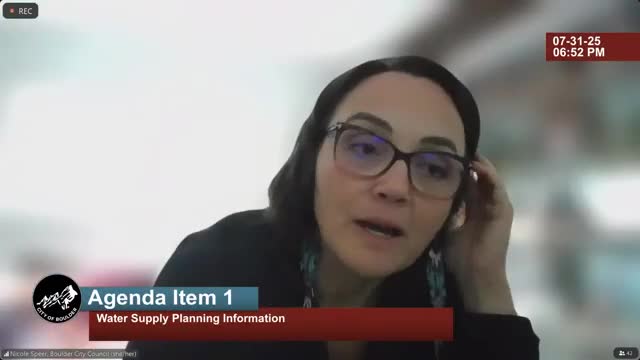Boulder Council Discusses Water Supply and Agricultural Prioritization Amid Drought Concerns
August 02, 2025 | Boulder, Boulder County, Colorado
This article was created by AI summarizing key points discussed. AI makes mistakes, so for full details and context, please refer to the video of the full meeting. Please report any errors so we can fix them. Report an error »

Boulder City Council is taking significant steps to address water management challenges as discussions around the integrated water supply plan and drought response strategies unfolded during the recent study session on August 2, 2025. The council emphasized the importance of community engagement in prioritizing water usage, particularly in scenarios of shortage, such as droughts.
Council members highlighted the need for a comprehensive drought plan that incorporates community values and guiding principles to determine water use restrictions. This plan aims to balance various needs, including residential and agricultural water usage, ensuring that local priorities are respected during water shortages. The council is committed to involving the community in these discussions, recognizing that effective water management is crucial for both municipal and agricultural stakeholders.
In addition to the drought plan, the council discussed the integration of water supply planning with broader land use policies. The integrated water supply plan will be informed by the ongoing comprehensive plan process, which aims to align water management strategies with community growth and sustainability goals. Council members expressed the necessity of maintaining flexibility in these plans, especially in light of potential changes stemming from negotiations related to the Colorado River Compact.
The council also addressed the importance of supporting local agriculture through efficient water use and leasing programs. Prioritizing water for users within the Boulder Creek Basin was noted as a key strategy, with most agricultural water being allocated to local farmers before considering users further downstream.
As the council moves forward, they are keen on ensuring that water management policies are inclusive and representative of all community voices. The discussions reflect a proactive approach to water stewardship, with an emphasis on collaboration and adaptability in the face of changing environmental conditions. The council's commitment to these initiatives signals a forward-thinking strategy aimed at securing Boulder’s water future while supporting its agricultural community.
Council members highlighted the need for a comprehensive drought plan that incorporates community values and guiding principles to determine water use restrictions. This plan aims to balance various needs, including residential and agricultural water usage, ensuring that local priorities are respected during water shortages. The council is committed to involving the community in these discussions, recognizing that effective water management is crucial for both municipal and agricultural stakeholders.
In addition to the drought plan, the council discussed the integration of water supply planning with broader land use policies. The integrated water supply plan will be informed by the ongoing comprehensive plan process, which aims to align water management strategies with community growth and sustainability goals. Council members expressed the necessity of maintaining flexibility in these plans, especially in light of potential changes stemming from negotiations related to the Colorado River Compact.
The council also addressed the importance of supporting local agriculture through efficient water use and leasing programs. Prioritizing water for users within the Boulder Creek Basin was noted as a key strategy, with most agricultural water being allocated to local farmers before considering users further downstream.
As the council moves forward, they are keen on ensuring that water management policies are inclusive and representative of all community voices. The discussions reflect a proactive approach to water stewardship, with an emphasis on collaboration and adaptability in the face of changing environmental conditions. The council's commitment to these initiatives signals a forward-thinking strategy aimed at securing Boulder’s water future while supporting its agricultural community.
View full meeting
This article is based on a recent meeting—watch the full video and explore the complete transcript for deeper insights into the discussion.
View full meeting
